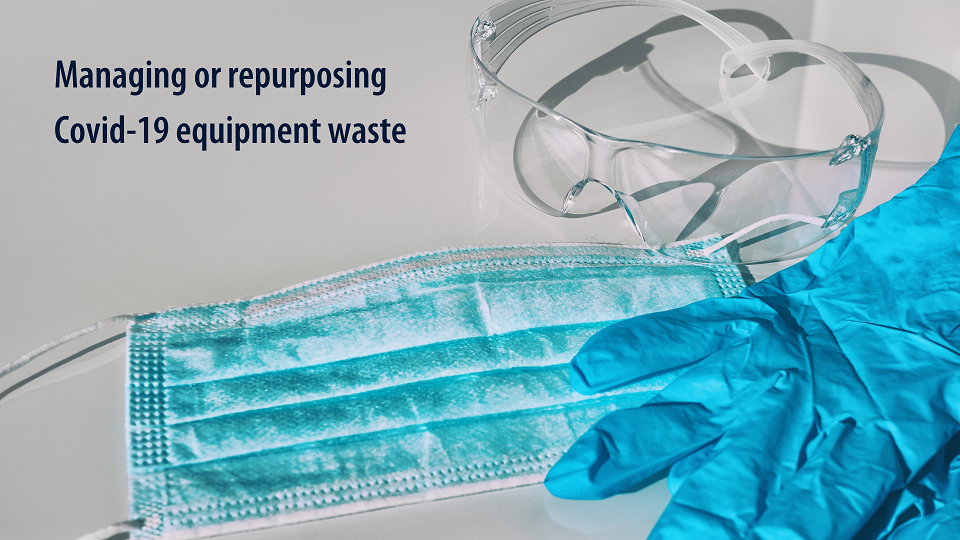
Managing or repurposing Covid-19 waste
Jurisdiction: International
How might we help re-think, repurpose or rehandle present and future Covid-19 waste?
Humanity was already fighting an uphill battle for sustainability and waste management, and now Covid-19 has accelerated the need for new, scalable, methods to safely dispose of Covid-19 hazardous waste and material without impacting the surrounding environment.
“Tens of thousands of tonnes of extra medical waste from the response to the COVID-19 pandemic has put tremendous strain on health care waste management systems around the world, threatening human and environmental health and exposing a dire need to improve waste management practices” - World Health Organization.
The WHO estimates that the response to the COVID-19 pandemic has so far generated:
• 87,000 tonnes of personal protective equipment (PPE) - procured between March 2020 - November 2021.
• Over 140 million test kits, with a potential to generate 2,600 tonnes of non-infectious waste (mainly plastic).
• 731,000 litres of chemical waste (equivalent to one-third of an Olympic-size swimming pool).
• Over 8 billion doses of vaccines administered globally producing 144,000 tonnes of additional waste in the form of syringes, needles, and safety boxes.
Most of this is expected to have ended up as waste, and these statistics don’t even account for other waste generated by the public such as disposable masks, disinfectant wipes, and hand sanitisers.
Due to the global health emergency, much of the focus was on procuring quality-assured supplies of PPE and related safety materials. Less attention and resources were dedicated to the safe and sustainable management of COVID-19 related healthcare waste.
“Today, 30% of healthcare facilities (60% in the least developed countries) are not equipped to handle existing waste loads, let alone the additional COVID-19 load. This potentially exposes health workers to needle stick injuries, burns and pathogenic microorganisms, while also impacting communities living near poorly managed landfills and waste disposal sites through contaminated air from burning waste, poor water quality or disease carrying pests.” - United Nations.
Some initial solutions have been developed such as:
• Eco-friendly packaging and shipping
• Safe and reusable PPE (e.g. gloves and medical masks)
• Recyclable or biodegradable materials
• Investment in non-burn waste treatment technologies, such as autoclaves
• Reverse logistics to support centralised treatment and investments in the recycling sector to ensure materials, like plastics, can have a second life
Your challenge is to use data and technology to re-think, repurpose or rehandle present and future Covid-19 equipment waste.
Insights referenced from: https://www.who.int/news/item/01-02-2022-tonnes-of-covid-19-health-care-waste-expose-urgent-need-to-improve-waste-management-systems
Additional Information:
Relevant links:
• https://www.who.int/teams/health-product-policy-and-standards/assistive-and-medical-technology/medical-devices/ppe/ppe-covid
• https://www.pnas.org/doi/10.1073/pnas.2111530118
• https://www.who.int/publications/i/item/9789240039612
• https://open.alberta.ca/dataset/covid-19-waste-management/resource/3685d9f2-1630-42bd-b613-52f0aa3edf3e
• https://www.ncbi.nlm.nih.gov/pmc/articles/PMC7447614/
• https://www.epa.vic.gov.au/about-epa/news-media-and-updates/coronavirus/handling-waste-during-coronavirus
• https://www.coronavirus.vic.gov.au/victorian-coronavirus-covid-19-data
• https://discover.data.vic.gov.au/dataset/victorian-testing-site-locations-for-covid-19
• https://discover.data.vic.gov.au/dataset/all-victorian-sars-cov-2-cases-by-local-government-area
Image credit: Infosys.
Entry: Challenge entry is available to all teams in Competition 2022.
